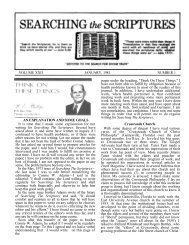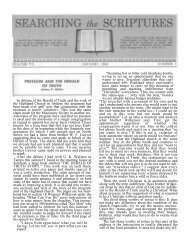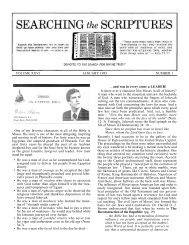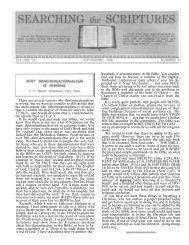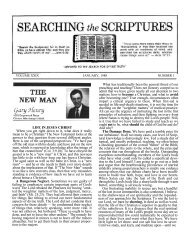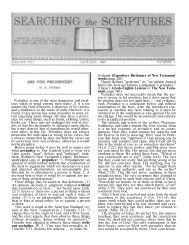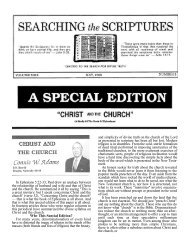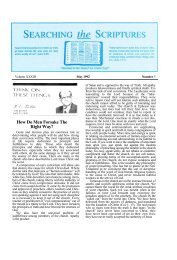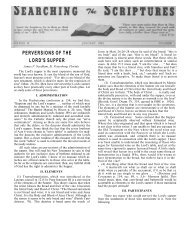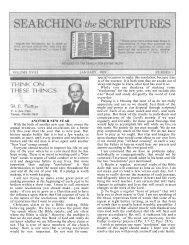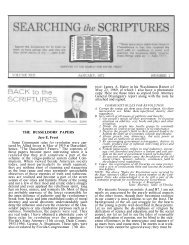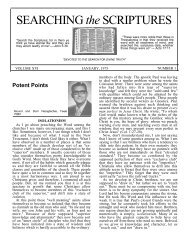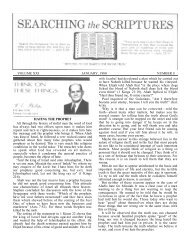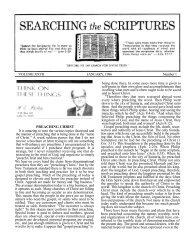Volume 31 – 1990 (PDF) - Searching The Scriptures
Volume 31 – 1990 (PDF) - Searching The Scriptures
Volume 31 – 1990 (PDF) - Searching The Scriptures
Create successful ePaper yourself
Turn your PDF publications into a flip-book with our unique Google optimized e-Paper software.
Page 8<br />
ANTIOCH — THE POWER OF THE<br />
LOCAL CHURCH<br />
LIVING THE DREAM<br />
"Go into all the world and preach the gospel to every<br />
creature... " was now a step closer to realization.<br />
Thanks to Antioch. After all, there would be no<br />
evangel-ism in distant places if some place did not<br />
sacrifice and send. Antioch was willing. And so with<br />
prayers and fasting, tears and hugs they waved goodbye<br />
to their beloved brothers Barnabus and Saul all the<br />
while pray-ing for the success of the gospel and God's<br />
protection over the men they loved (Acts 13: 2-3). Our<br />
study continues...<br />
First Stop — Cyprus<br />
In 13: 5-6a Luke gives a quick summary of their work<br />
on the island. Here two things happen about which the<br />
writer offers no details. It was here that (1) Saul begins<br />
to be referred to as "Paul" (vs. 9 - probably to render him<br />
with greater effectivity among the Gentiles), and (2)<br />
Paul emerges as the leader (whereas before it was<br />
"Barnabus and Saul" (13: 2), now it is "Paul and his<br />
company" (13: 13). <strong>The</strong>n something happens which<br />
Luke carefully chronicles.<br />
1. <strong>The</strong> Men, vs. 6-7. Sergius Paulus: a Roman, a man<br />
of intelligence and most of all the governor of the island.<br />
And we know something else. He was searching... No<br />
doubt he had heard about the arrival of two men who<br />
claimed to preach the word of God. Thus he "summoned<br />
Barnabus and Saul... "<br />
<strong>The</strong>re was another man: Elymas the magician.<br />
Lately Elymas had been spending a lot of time with<br />
Sergius Paulus hoping to impress him with his "occultic<br />
powers" and thereby gain a position of influence in the<br />
house of the proconsul. It was a career move on his<br />
part, a power play that would launch him into immediate<br />
recognition and financial reward. It's no wonder<br />
that he was not pleased with the preaching of Paul and<br />
Barnabus (vs. 8b).<br />
2. <strong>The</strong> Method, vs. 9-10. Take a good look at<br />
Paul's response to Elymas. Is there a more fiery<br />
denunciation in all of Scripture? Paul described him<br />
in character (vs. 10a) and in motive (vs. 10b). Finally,<br />
not only did Elymas feel the sting of verbal rebuke,<br />
he received physical punishment in the form of<br />
blindness (vs. 11).<br />
3. <strong>The</strong> Motivation. Why such a strong<br />
response? Three reasons. First, Elymas was a false<br />
prophet. Second, not only was he a false prophet<br />
but he was a Jewish false prophet who dabbled in<br />
sorcery. But there<br />
was a third reason... Paul uttered these scorching<br />
words because Elymas was standing in the way of<br />
Sergius Paulus. A careful search of the <strong>Scriptures</strong> will<br />
reveal that the severest of words are reserved for those<br />
who stand between other men and the truth. Here was a<br />
man who was searching, a man of intelligence, a man attempting<br />
to locate the will of God for his life and, at the<br />
same time, here was another man attempting to pervert<br />
that will. God knew the hearts of both men and allowed<br />
Paul to know them (vs. 9). Thus the Holy Spirit inspired<br />
Paul to speak these words of harsh rebuke and to demonstrate<br />
the genuineness of his message by miraculous<br />
sign. Yet in the midst of a fiery denunciation, there was<br />
a touch of tenderness even upon the soul of Elymas. He<br />
would be blind only "for a time. " <strong>The</strong> result is given in<br />
verse 12 -<br />
"<strong>The</strong>n the proconsul believed when he saw what had<br />
happened, being amazed at the teaching of the Lord. "<br />
Note the final word from the island of Cyprus: "he<br />
believed. " We don't know much about the other events<br />
that happened on this island but we do know this: the<br />
message of Jesus was preached and it touched honest<br />
hearts. Paul and Barnabus went on their way rejoicing.<br />
Second Stop - Pamphylia<br />
Acts 13: 13. Here again Dr. Luke presents the facts and<br />
quickly moves on. Pamphylia was a low-lying desolate<br />
area whose people were known for being backward and<br />
illiterate. <strong>The</strong> living conditions here were some of the<br />
worst in the Empire. It was here that Paul became ill<br />
(Gal. 4: 13-14). Surely it's not fun to be sick any time but<br />
there's nothing worse than being sick away from home.<br />
How Paul must have longed to be back with his beloved<br />
brethren in Antioch. But he wasn't. He was far away in<br />
a lonely desolate place. <strong>The</strong>re was nothing to do except<br />
trust in the Lord and move on.<br />
Except Mark. Luke in a simple statement of fact<br />
reports that Mark went back home (vs. 13b). Why? We're<br />
not sure. Likewise, Acts 15: 36-38 reveals the fact of his<br />
desertion but gives no reason. Perhaps Mark missed his<br />
association with the apostle Peter. <strong>The</strong>re is no question<br />
that no one had impacted his life quite the way that Peter<br />
had (Acts 12; 1 Pet. 5: 13). But there is probably another<br />
reason... a more realistic one. Perhaps Mark was homesick.<br />
After all, the mountain-top experience of working<br />
with the church at Antioch and then the encouraging<br />
reception on Cyprus had now faded into the pits of<br />
Pamphylia. Everywhere he looked the young preacher<br />
saw sickness, disease, and danger. Everything was unfamiliar.<br />
He had to eat strange food, observe different<br />
customs and then to top it all off there was the set-back<br />
of Paul's illness. What would they do if something should<br />
happen to Paul? — he must have wondered. And so, as<br />
Mark laid down at night on a strange bed and in a strange<br />
place his heart must have ached of loneliness. He wanted<br />
to go home. And did.<br />
Maybe we've been too hard on John Mark. Maybe you<br />
would have echoed the same sentiment as Paul: "He's not<br />
worthy to travel again, he who deserted us in Pamphylia...<br />
" But not me. My sympathy leans toward Barnabus.<br />
I have a reason.<br />
In one sense there is no joy for a preacher like that of



